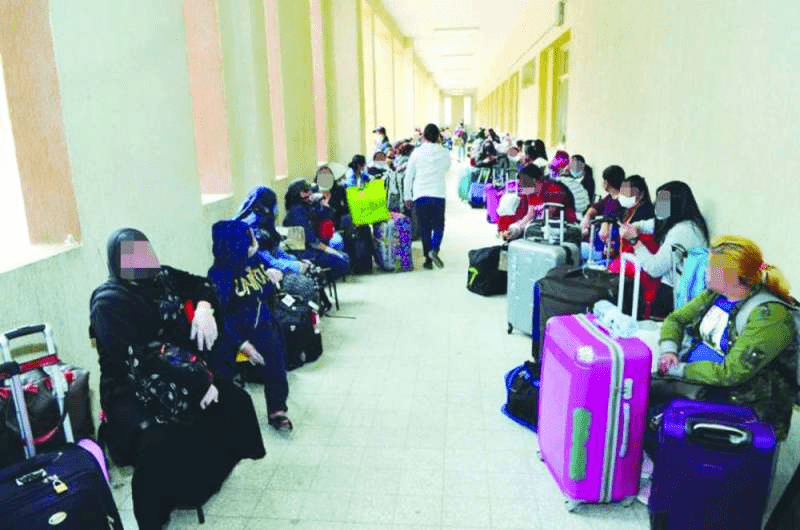30/03/2022
30/03/2022
KUWAIT CITY, Mar 29: While the people of Kuwait are waiting for the holy month of Ramadan, many are looking forward to receiving domestic workers and expatriate helpers that the domestic labor offices are seeking to attract, reports Al-Rai daily.

Specialists in domestic labor affairs and human rights activists said, “The problem will worsen in the holy month, as the cost in some offices will touch the limit of around KD 2,000 for those who want immediate delivery of the domestic worker. The burden of household costs on these workers is likely to increase”.
They stressed the need to "start educating employers and domestic workers about their rights and duties", adding that, "The violations that some are subjected to remain individual and cannot be generalized.
The high costs for recruiting domestic workers, which the state legislation did not succeed in limiting and are paid to the office and not to the worker, led the employers to seek illegal ways to force the domestic worker to complete the contract period, or sometimes extend it against the worker’s will”.
A specialist in domestic labor affairs and the owner of a domestic labor office, Bassam Al-Shammari, said, “The problem of domestic labor will worsen in the month of Ramadan. The nature of this month increases the burden of costs on those workers.
The costs of some offices for those who want immediate delivery of the domestic worker have reached KD 2,000 or a little less. This cost is lower for those who have the ability to wait a month or two.
There is a segment of domestic workers who are working for their own account in agreement with the sponsor, and another segment working for the personal small projects of the sponsors. Also, about half of the domestic workers in Kuwait are male workers, and this means that there is a huge deficit.
The measures for openness contributed to reviving the market of domestic workers. An Ethiopian delegation will visit Kuwait to sign the final agreement within Ethiopian visits to a number of countries in the region, including Oman and Bahrain.
Indonesia sends its workers to the rest of the Gulf countries and not to Kuwait because some of these countries have abolished the sponsorship system and others adhered to the requirements set by the Indonesian side. The requirement to ratify the criminal status sheet for Filipino workers from the Philippine Foreign Ministry delays their arrival by about three months".
Furthermore, Secretary of the Kuwait Society for Human Rights Hussein Al-Otaibi stressed the need to take into account the humanitarian aspects in dealing with domestic workers.
He said, "The human rights society has issued several publications in different languages in an effort to help domestic workers know their rights.
The society has established a special unit to monitor and follow up issues of migrant workers' rights in Kuwait, shed light on employment issues, and issue periodic analytical reports.
The domestic workers in Kuwait constitute about a third of the workforce. Some of them are subject to abuse, but these violations remain individual and cannot be generalized”.
Secretary of the Humanitarian Line Organization Taher Al-Baghli said, "Although the rights mentioned in the domestic labor law do not rise to the level of guaranteeing all the human rights of domestic workers, some of those rights are not granted, either in a large or incomplete way, such as setting working hours, rest periods and weekends, and enabling workers to leave the house outside working hours.
An employer often does not comply with the law by paying for hours and days of overtime and the end-of-service gratuity as stipulated by law. Some of the employers are still holding the official documents of domestic workers, which is a violation of the law”.
He attributed this to the high fees for the recruitment of domestic workers, which state legislation did not succeed in reducing, and the fact that the fees are paid to the office and not to domestic workers, which leads the employers to seek illegal ways to force the domestic workers to complete the contract period, or sometimes longer.
Al-Baghli stressed that, "The current official procedures allow the transfer of the residency of the domestic worker without his consent or knowledge or signing a new contract as stipulated in the domestic labor law, which could deprive the worker of many of his rights.
At the same time, despite the efforts that the state has undertaken to educate workers about rights and complaint mechanisms, these efforts are still insufficient, as the number of domestic workers, which exceeds 600,000, speak different languages. Therefore, the process of educating them requires great effort.”
Al-Baghli called for “educating employers and domestic workers about their rights and duties, and developing the domestic labor law to provide greater protection for domestic workers and ensure that they are not directly or indirectly affected if they file a complaint.”


